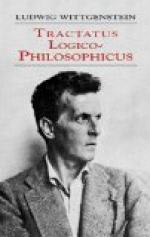2.014 Objects contain the possibility of all situations.
2.0141 The possibility of its occurring in states of affairs is the form of an object.
2.02 Objects are simple.
2.0201 Every statement about complexes can be resolved into a statement about their constituents and into the propositions that describe the complexes completely.
2.021 Objects make up the substance of the world. That is why they cannot be composite.
2.0211 If they world had no substance, then whether a proposition had sense would depend on whether another proposition was true.
2.0212 In that case we could not sketch any picture of the world (true or false).
2.022 It is obvious that an imagined world, however difference it may be from the real one, must have something— a form—in common with it.
2.023 Objects are just what constitute this unalterable form.
2.0231 The substance of the world can only determine a form, and not any material properties. For it is only by means of propositions that material properties are represented—only by the configuration of objects that they are produced.
2.0232 In a manner of speaking, objects are colourless.
2.0233 If two objects have the same logical form, the only distinction between them, apart from their external properties, is that they are different.
2.02331 Either a thing has properties that nothing else has, in which case we can immediately use a description to distinguish it from the others and refer to it; or, on the other hand, there are several things that have the whole set of their properties in common, in which case it is quite impossible to indicate one of them. For it there is nothing to distinguish a thing, I cannot distinguish it, since otherwise it would be distinguished after all.
2.024 The substance is what subsists independently of what is the case.
2.025 It is form and content.
2.0251 Space, time, colour (being coloured) are forms of objects.
2.026 There must be objects, if the world is to have unalterable form.
2.027 Objects, the unalterable, and the subsistent are one and the same.
2.0271 Objects are what is unalterable and subsistent; their configuration is what is changing and unstable.
2.0272 The configuration of objects produces states of affairs.
2.03 In a state of affairs objects fit into one another like the links of a chain.
2.031 In a state of affairs objects stand in a determinate relation to one another.
2.032 The determinate way in which objects are connected in a state of affairs is the structure of the state of affairs.
2.033 Form is the possibility of structure.
2.034 The structure of a fact consists of the structures of states of affairs.
2.04 The totality of existing states of affairs is the world.




